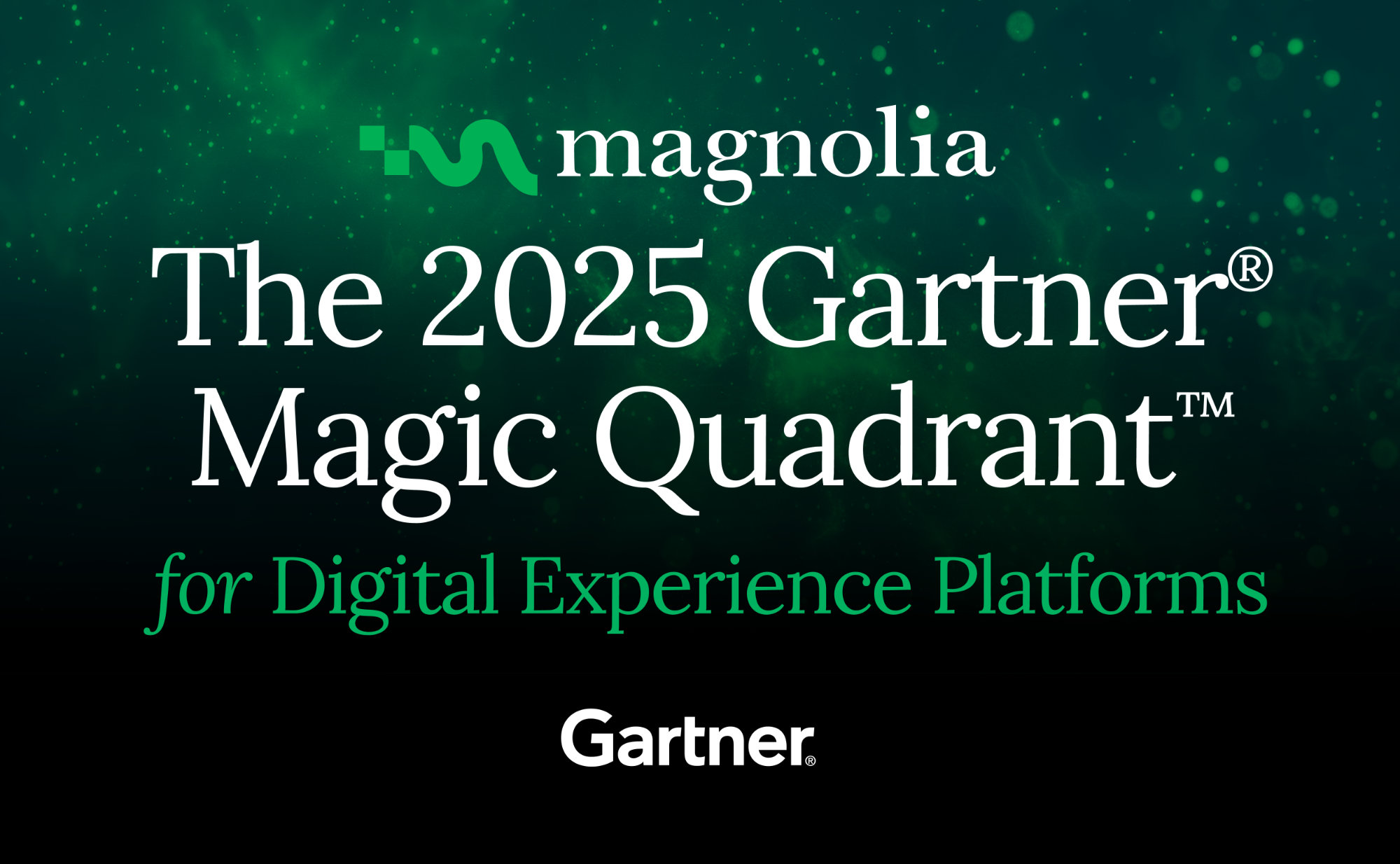- Oct 24, 2023
- 11 min
Why flexibility matters in your CMS choice
Magnolia in action
Take 12 minutes and a coffee break to discover how Magnolia can elevate your digital experience.
Flexibility and scalability are essential for ensuring seamless adaptation to future changes. In a world where consumer expectations are changing and technical landscapes are transforming, the ability to provide engaging, tailored, and responsive digital experiences can mean the difference between success and failure. Adopting a flexible CMS equips companies to “roll with the punches” and maintain an edge in a continuously changing market.
This is why there has been a growing demand for more flexible CMSs in recent years. These CMSs are designed to be scalable, extensible, and easily adaptable to the evolving needs of businesses. They offer comprehensive features such as collaboration, templating, and workflow management.
This article explores the benefits of a flexible CMS, and its potential to drive business growth. Additionally, we provide recommendations for the best flexible CMS available.
Why do businesses require flexibility?
Flexibility has emerged as a critical factor for business success. The ability to respond rapidly, innovate effectively, and provide exceptional experiences will distinguish forward-thinking enterprises and drive their growth and profitability. Economic downturns, technological breakthroughs like ChatGPT, the COVID-19 pandemic, and various unforeseen events have emphasized the need for agility and adaptability in ever-competitive markets.
Business flexibility driven by technology enables companies to achieve faster time to value by quickly delivering innovative products and services to meet customer demands. Additionally, this flexibility allows businesses to accelerate time to market, aligning offerings with customer expectations and establishing a customer-centric brand image. Moreover, a culture of innovation fueled by technology sets businesses apart from competitors, leading to customer advocacy.
A study by McKinsey and Company established that companies prioritizing flexibility in their technology infrastructure are more likely to outperform their peers in revenue growth. Grid Dynamics’ research reveals that forward-thinking companies allocate more than 58% of their IT budget to flexible IT infrastructure. This strategic investment enables them to embrace cutting-edge technological advancements, address unforeseen system needs, and effectively expedite development cycles.
Today’s customers are more demanding than ever, seeking personalized and seamless experiences. They expect businesses to understand and cater to their unique preferences while delivering consistent service. According to Gartner, this “Everything Customer” mindset challenges businesses to provide experiences that are contextual, intelligent, and connected.
Magnolia’s platform has been developed to give enterprises the flexibility they need to grow their business not just survive, but thrive as they meet these challenges.
How can technology enable flexibility?
Customers nowadays can quickly grow frustrated with conventional service approaches - and if that happens they’ll quickly find your competitors. This shift in customer preferences is driving organizations to reassess their business models, marketing strategies, service delivery methods, and the technology itself to better cater to their customers’ needs.
Therefore, technology must possess task-oriented capabilities to adapt to these evolving needs and circumstances, ensuring it remains a valuable tool for businesses. One way technology can adapt is by being composable.
Unlike a closed or monolithic platform, a composable architecture allows businesses to swap different technologies in and out as needed seamlessly. This modular approach empowers organizations to customize their technology stack, selecting the specific tools and solutions that best align with their evolving requirements. By embracing a composable architecture, businesses can efficiently respond to changing demands, integrate new technologies, and optimize their operations for enhanced performance and agility.
Creating strong digital customer experiences has emerged as a critical component for enhancing the technological flexibility of businesses across industries, as customers now expect seamless, personalized, and engaging interactions across various touchpoints. Delivering exceptional digital experiences is vital for attracting and retaining customers, driving brand loyalty, and gaining a competitive edge.
To effectively manage their entire digital presence and create outstanding digital experiences, businesses can leverage a composable Digital Experience Platform (DXP). This solution aligns with the principles of composable architecture, offering flexibility in assembling and orchestrating different digital experience tools and components.
With a composable DXP, businesses can efficiently leverage content, customer data, ecommerce functionalities, and more, to deliver cohesive and captivating digital experiences and marketing campaigns to their target audience.
What is a composable digital experience platform?
A DXP is "an integrated set of technologies designed to enable the composition, management, delivery, and optimization of contextualized digital experiences across multi-experience customer journeys." This definition, from Gartner's latest Magic Quadrant, emphasizes the comprehensive nature of DXPs and the ability to orchestrate personalized experiences across various channels and touchpoints.
A composable DXP extends the concept of a DXP by adopting modularity and flexibility principles. It enables enterprises to assemble and coordinate various capabilities and technologies, making it simple to swap out specific tools or components as required. This high level of adaptability enables firms to future-proof their technology stack.
Future-proofing the stack refers to building a technology infrastructure that can quickly adapt and incorporate new capabilities or technologies as needed. It ensures that businesses can stay agile, respond to changing market dynamics, and effectively meet evolving customer expectations.
To better understand DXPs, refer to "DXP 101: From disjointed to seamless customer experiences – A beginner's guide to Digital Experience Platforms" This guide provides comprehensive insights into DXPs, their benefits, and how they can transform customer experiences.
Everything about composable DXP
We've collected all our DXP resources for you. Check out our DXP white papers, read an analyst report, or learn from our customers how they tailored their DXP to their needs. Use our DXP Benchmark tool to check your digital maturity level and see how your DXP stacks up against the competition.
What is the Magnolia Composable DXP?
Magnolia’s Composable DXP is a powerful and flexible digital platform that empowers businesses to create, manage, and deliver exceptional digital experiences. It offers a wide range of capabilities to support enterprises on their digital journey. Let’s take a look at some of its key features.
Consolidate
Magnolia serves as a centralized content repository for all digital content. This content hub allows businesses to access and manage their content in one place, enabling easy reuse across multiple channels. By preventing duplication and ensuring consistency, companies can streamline content management processes and deliver cohesive experiences to their audience.
Connect
Magnolia DXP enables seamless connectivity, providing easy integrations with various data sources, applications, and channels. This connectivity allows businesses to leverage existing systems and connect with future technologies, ensuring a flexible and future-proof solution. By seamlessly integrating different tools and data sources, companies can enhance their digital experiences and deliver personalized content to their customers.
Create
Additionally, Magnolia’s DXP offers unified authoring. Businesses can compose and manage relevant content in one streamlined workflow — regardless of the content source. This unified authoring approach simplifies content creation, reduces complexity, and improves efficiency. Non-technical users can work in an environment using a versatile content editor to create structured and semi-structured content, regardless of content type or source, ensuring a seamless and productive content management experience.
How does Magnolia’s DXP enable flexibility?
Magnolia’s DXP enables flexibility through its three core aspects, according to the three Cs in the preceding section: the content hub, integrations, and unified authoring capabilities. Let's explore each element and how they contribute to flexibility.
Content Hub
Magnolia’s DXP provides a content hub that consolidates content from various sources, such as traditional content management systems, headless content management systems, or other content pools. This consolidation allows businesses to leverage their existing content investments and avoid duplication. Businesses can flexibly create new experiences from existing content by using pieces of content as composable components. This approach promotes the "Create Once, Publish Everywhere" (COPE) strategy, allowing businesses to reuse content across multiple digital channels and touchpoints, increasing efficiency and enabling faster content delivery.
Integrations
Magnolia’s DXP follows a composable architecture approach, allowing businesses to integrate any data or service to enhance and contextualize experiences. This flexibility enables enterprises to connect Magnolia with various systems and tools, including ecommerce platforms, SEO tools, marketing tools, automated solutions, analytics tools, digital asset management systems, and optimization tools. These integrations unite best-of-breed technologies to solve specific needs. By integrating these additional tools, Magnolia becomes a central hub that orchestrates and optimizes the digital experience across the entire technology stack, allowing companies to create a unified and dynamic digital ecosystem while streamlining operations. Businesses may now reach audiences with greater precision, relevance, and engagement.
Unified Authoring
Magnolia brings together various teams and stakeholders through its unified authoring capabilities. It enables collaboration across groups, allowing content creators, marketers, and developers to collaborate seamlessly. This unified authoring approach provides a friendly user interface for editing websites and web applications using a visual editor built using the headless architecture approach, catering to both headless architecture and traditional website needs. The visual editing capabilities give non-technical users control over the content and presentation of digital experiences, reducing dependency on developers and facilitating faster iterations. This flexibility empowers businesses to adapt and respond quickly to changing market needs and deliver personalized and engaging experiences to their audience by promptly tailoring offerings and interactions in alignment with shifting market dynamics.
Union Investment Case-study
Union Investment is an active asset manager based in Frankfurt am Main, Germany, offering a comprehensive range of investment solutions across asset classes and regions. The company had been facing high operating and maintenance costs for its 70 brand and campaign websites across different repositories for years and needed a solution to unify its code bases and technologies, solve the challenges of its coupled design, and overcome the burdens of manual user management using a single DXP, Magnolia - and they haven't looked back since.
Union Investment improved the editorial and end-user experience by cooperating with PRODYNA and Magnolia to implement their one-DXP approach. They generated considerable cost savings by lowering both run-time and maintenance costs and improving change implementation efficiency and time to market for new websites. Union Investment now has a flexible and future-proof platform that allows their team to perform their duties effectively, thanks to Magnolia's easy integration of static web apps and various expandable headless APIs.
“Union Investment has relied on Magnolia as our central DXP for nearly a decade. The best-of-breed approach guarantees seamless integrations and maximum reliability. As equal partners, the collaboration with Magnolia is extremely valuable. Magnolia is essential in helping us reach our target audiences more effectively and supporting our growth on an ongoing basis.”
Check out our 12 minute Magnolia run-through or book a personalized demo with us to see firsthand how Magnolia DXP can add value to your business by helping you create a unique digital experience for your customers.










